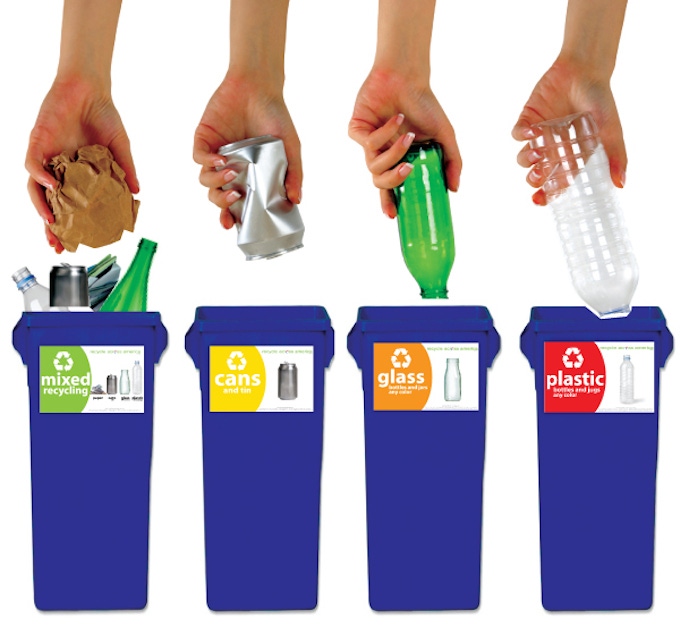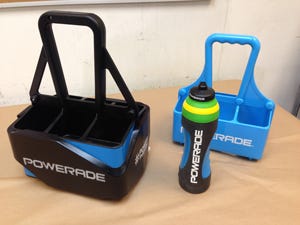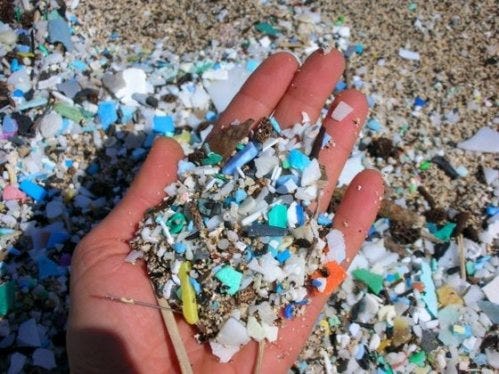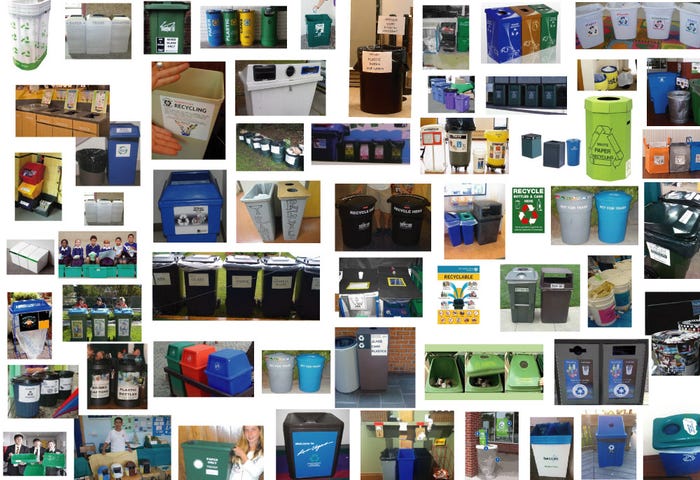Have you ever walked up to a trash bin and a recycling bin and felt confused on what goes where? Even if you work with plastics in some shape or another on a day-to-day basis, the answer is probably yes. But don't feel sheepish; you're not the only one.The confusion at recycling bins inspired Michelle "Mitch" Hedlund to think of an innovative idea that could change the recycling game for good. While working in the sustainability field, she would meet with various companies and each one had the same issue: recycling was not working.
July 11, 2014

Have you ever walked up to a trash bin and a recycling bin and felt confused on what goes where? Even if you work with plastics in some shape or another on a day-to-day basis, the answer is probably yes. But don't feel sheepish; you're not the only one.
The confusion at recycling bins inspired Michelle "Mitch" Hedlund to think of an innovative idea that could change the recycling game for good. While working in the sustainability field, she would meet with various companies and each one had the same issue: recycling was not working.
|
An example of all the different labels on the market. |
"I then started to reflect on my own recycling habits," Hedlund, executive director of Recycle Across America, told PlasticsToday. "I would be at the airport and go up to the bins and no matter what, I would have a quick moment of wondering which bin I should put the can in. So I'm having these moments personally and with speaking to companies, I realized that I'm not the only one confused by recycling. Everyone is confused."
During a sustainability conference in which Hedlund was asked to speak at, she decided to test out her confusion theory on the audience. She showed an image of five different stop signs, but none of them looked like the stop sign that we are used to in the states.
"What would happen in society if we had to come up with our own stop sign? I then flipped the screen and it filled up with all the various recycling bins, and none of them had the same looking label. And that is what recycling looks like to us today," she said.
After doing more research, Hedlund came to the conclusion that the inefficiency of recycling comes down to our experience at the bin.
"The general public likes the idea [of recycling] in theory, but it's so confusing they aren't able to do it properly," she said. "The manufacturers have a tremendous amount of pressure to use recycled content, but the commodity is not something that they can rely on and they don't know if there's enough to make the switch."
But how can you fix a broken system? By incorporating standardized recycling labels, which is how the nonprofit Recycle Across America (RAA) was born.
The labels
In developing the labels, Hedlund said that the organization called on several different industry leaders from all types of backgrounds for their input. She said they had to make sure the labels were effective with color coding and wording. Here are the standardized labels:

Within months of creating a website, Hedlund said that companies started to reach out to the nonprofit to use the labels. Currently, NBCUniversal, Hallmark, Kohler, Walt Disney World employee areas, Procter & Gamble manufacturing, SanDisk, AOL, about 2,000 U.S. K-12 schools - including all the public schools in Washington DC, many universities including University of Denver, George Mason University, Johns Hopkins University, are adopters. Today, approximately half a million of RAA's standardized labels are in use throughout the U.S., Canada and Europe.
Hedlund said that use of the standardized labels on recycling bins have shown to increase recycling levels by more than 50 percent and it significantly reduces the amount of trash thrown in recycling bins. In addition, she said the labels help ensure a consistent quality and quantity of recycled materials. She said that helps keep the cost of recycled raw materials competitive with virgin materials.
"Once we started to hear that feedback, we realized that this solution really could be a game changer for recycling - and ultimately - for manufacturers," she said.
Recycling partnerships
RAA has joined forces with Participant Media to launch a social action campaign focused on transforming recycling and improving the economics and prevalence of sustainable packaging and manufacturing. The campaign is inspired by Participant's new show "Human Resources," premiering August 8 on its television network Pivot.
"Human Resources" follows the non-stop, deadline-driven world of TerraCycle, a company whose mission is to eliminate waste on a global scale. The Recycle Right! campaign offers informational videos, tips and practical solutions - such as standardized recycling labels - to help everyone recycle right and increase the amount of quality raw recycled materials available to be used by manufacturers looking to lessen their environmental footprint.
Chad Boettcher, EVP of social action and advocacy at Participant Media said, "We know that recycling is the most important action we can do to improve the environment yet the percentage of valuable materials being recycled has not improved much over the past 17 years," Boettcher continues, "We are eager to work with Recycle Across America and TerraCycle to spread awareness on such a tangible and easy step we can all take in improving the health of our world environmentally and economically."
Potential impact on plastics
The plastics industry is constantly dealing with images of plastic debris floating in the ocean. And while one side of the debate tends to blame the industry for creating the packaging, what is sometimes missing in that argument is the notion that the package wasn't handled properly after use.
 "It's unfortunate for the plastics industry because it has their fingerprints on it and even though they manufacture it, people bought it, used it and it ends up in the ocean," she said. "But it's not as if the plastics industry put it there themselves."
"It's unfortunate for the plastics industry because it has their fingerprints on it and even though they manufacture it, people bought it, used it and it ends up in the ocean," she said. "But it's not as if the plastics industry put it there themselves."
Hedlund said she would like the plastics industry to get behind the standardized recycling label solution, which would provide the industry an opportunity to be part of something that is proactive to the general public and consumers in general.
"We need to make sure we are all on the same page that consumers are handling it properly, the more they handle it properly, they will recycle it right," she said. "I firmly believe that the only way to stop having all this debris of plastic end up in the ocean is to have these materials seen as highly valuable. The only way to do that is to get the general public to understand why recycling is critical and make it easy to do."
Hedlund says that this is not just a solution for North America, but believes that it can be adopted on a global scale.
"When you look at the solution, it's very transformational," she said. "And I do think the biggest winners in it could be the plastics industry."
About the Author(s)
You May Also Like



